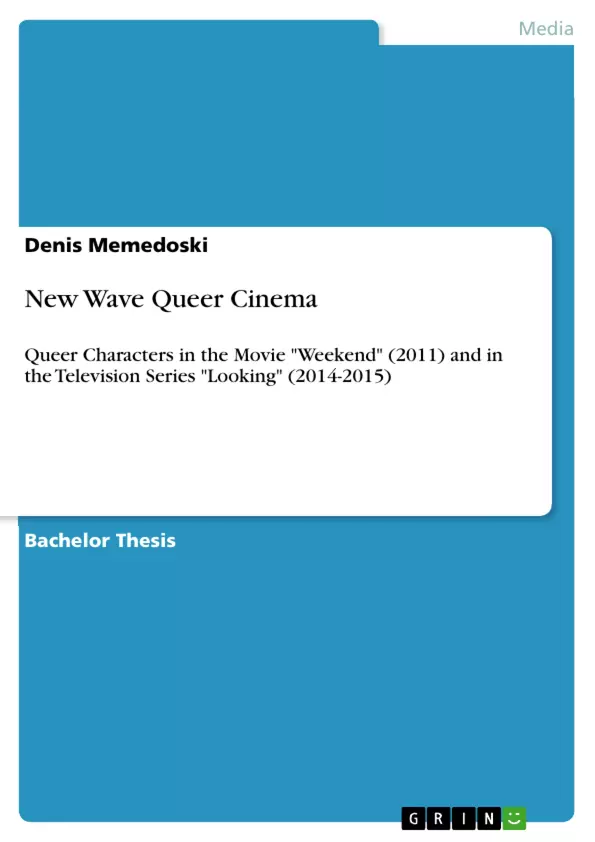This thesis will deal with the term New Queer Cinema, its history, and how the "new wave" is different, as well as discussing where "queerness" occurs in non-queer television shows. Furthermore, it will analyze New Wave Queer Cinema in the examples of "Weekend" and "Looking" with a look on film aesthetics and the issues that arise in their plots. Moreover, an analysis on the coming out stories of some of the characters in both Weekend and Looking will help to display the significance in bringing issues to the viewer in the form of New Wave Queer Cinema. Covering articles by scholars, critics and writers like B. Ruby Rich, James Morrison, Monica B. Pearl, and Helen Hok-Sze Leung, among others, a light will be shed on New Queer Cinema as well as New Wave Queer Cinema.
New Wave Queer Cinema, as the name already suggests, derives from New Queer Cinema; a movement prevalent in the very late 1980s and the 1990s. What it tries to do is to portray its characters not in a comical light, like the gap between the two movements seems to suggest, but in an authentic and realistic light. What makes Looking furthermore special is that it is one of its kind. There are no other television shows that have featured gay main characters in a realistic setting before. There might be "Queer as Folk" (2000-2005) or "Will & Grace" (1998-2006), but neither can be described as New Wave Queer Cinema.
However, still not being the norm in media or beyond, New Wave Queer Cinema tries to overlook that specific detail and tries to handle the stories it tells in a way that does not solely highlight the "queerness", but tries to be about the people it talks about. But where there is "queer", it is easy for a general audience to dismiss it. It seems that it will take much more time for people to realize that queer films, literature, and even lifestyle are nothing to frown upon and that they are here to stay.
Inhaltsverzeichnis (Table of Contents)
- Introduction
- What else is Queer?: A Look at Queer Characters in Non-Queer Television Shows and a Brief History on New Queer Cinema.
- New Wave Queer Cinema in the Example of Weekend and Looking.
- Weekend
- Looking
- Coming Out in Weekend and Looking.
- Weekend
- Looking
- Conclusion: The Contemporary State and the Future of Queer Cinema
Zielsetzung und Themenschwerpunkte (Objectives and Key Themes)
This thesis aims to analyze the evolving landscape of queer cinema, specifically focusing on the "New Wave Queer Cinema" movement, as exemplified by the film "Weekend" (2011) and the television series "Looking" (2014-2015). The thesis will delve into the history of queer cinema, exploring how the portrayal of queer characters in non-queer television shows shaped the development of the genre. Furthermore, the thesis will examine how "Weekend" and "Looking" present authentic and realistic representations of gay characters and storylines, departing from traditional stereotypes often associated with queer cinema.
- The evolution of queer cinema, from early portrayals to New Wave Queer Cinema
- The impact of stereotypical representations of gay characters in non-queer television shows
- The portrayal of authentic and realistic gay characters and storylines in "Weekend" and "Looking"
- The significance of coming out narratives within the context of New Wave Queer Cinema
- The contemporary state and future of queer cinema
Zusammenfassung der Kapitel (Chapter Summaries)
The introduction explores the critical reception of "Weekend" and its place within the New Wave Queer Cinema movement, contrasting it with earlier depictions of gay characters in media. The first chapter analyzes the prevalence of stereotypical representations of gay characters in non-queer television shows, highlighting the emergence of New Queer Cinema as a response to these portrayals. The second chapter examines how "Weekend" and "Looking" embody the characteristics of New Wave Queer Cinema, focusing on their realistic and authentic portrayals of gay characters and their lived experiences. This chapter also explores the unique significance of "Looking" as a television series that features gay characters in a realistic setting.
Schlüsselwörter (Keywords)
New Wave Queer Cinema, New Queer Cinema, queer representation, gay characters, television shows, "Weekend," "Looking," coming out, film aesthetics, authentic portrayal, realistic portrayal, stereotypes, queer cinema history.
Frequently Asked Questions
What is "New Wave Queer Cinema"?
It is a contemporary movement that focuses on authentic and realistic portrayals of queer characters, moving away from the comical or stereotypical depictions of the past.
How does "Looking" differ from previous gay-themed TV shows?
Unlike "Will & Grace" or "Queer as Folk," "Looking" is noted for its realistic setting and for featuring gay main characters in a way that prioritizes their humanity over tropes.
What role do "coming out" stories play in this thesis?
The thesis analyzes coming out narratives in "Weekend" and "Looking" to show how they bring significant issues to the viewer through a modern, realistic lens.
Who are some key scholars mentioned in the research?
The work covers articles by critics such as B. Ruby Rich, James Morrison, and Monica B. Pearl to provide historical context for New Queer Cinema.
What is the future outlook for Queer Cinema according to the text?
The text suggests that while queer media is becoming more established, it will take more time for general audiences to fully move past dismissal and frowns toward queer lifestyles.
- Arbeit zitieren
- Denis Memedoski (Autor:in), 2015, New Wave Queer Cinema, München, GRIN Verlag, https://www.grin.com/document/463598



